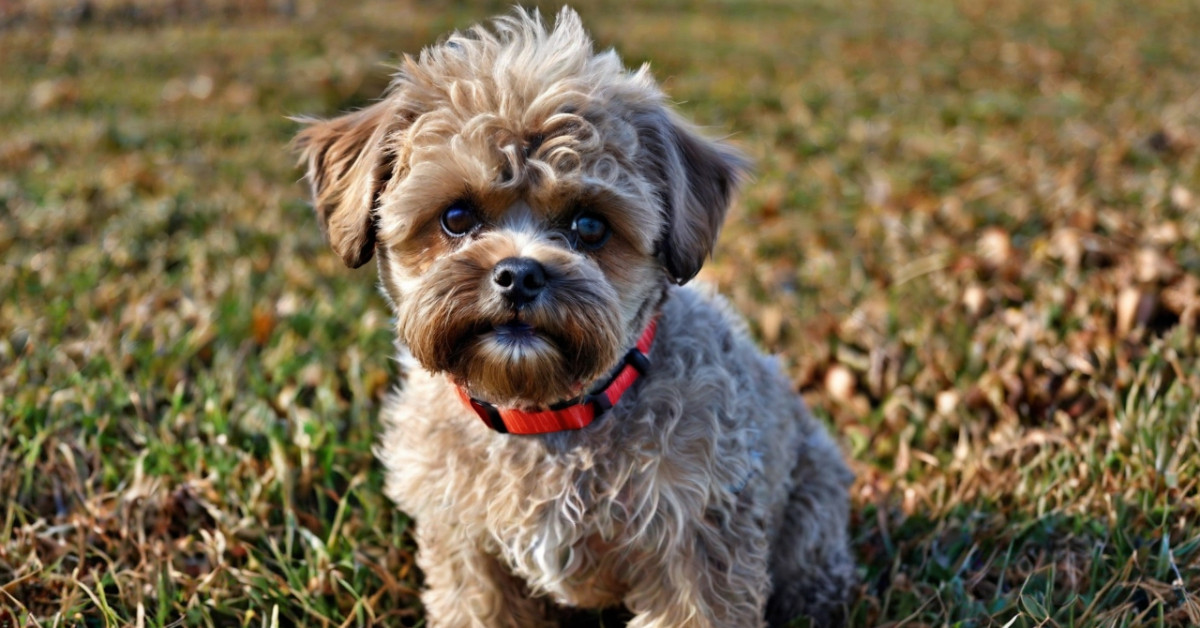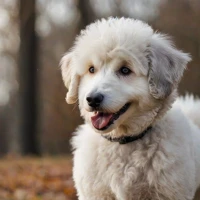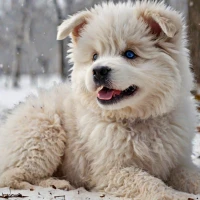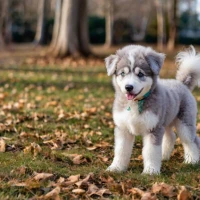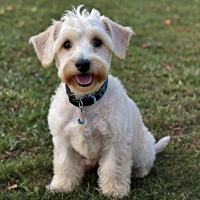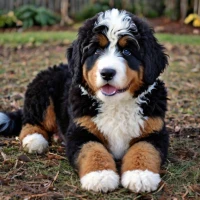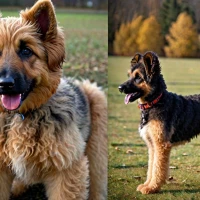Discovering the Griffondoodle: Brussels Griffon Poodle Mix
When I first laid eyes on a Griffondoodle at my friend’s house, I was immediately captivated by its charming, almost human-like expression and the adorable scruffy fur that seemed to have a personality all its own. My friend, Jenny, had just adopted this little bundle of joy and couldn’t stop gushing about her new pet. And honestly, who could blame her? The Griffondoodle—a fascinating mix of a Brussels Griffon and a Poodle—has a unique allure that makes it impossible to resist.
Origins and History
Griffondoodles, like many designer breeds, have relatively recent origins. The intent behind creating this hybrid was to combine the best traits of the Brussels Griffon and the Poodle, two breeds known for their intelligence, affectionate nature, and low-shedding fur. What’s cool about crossbreeds is they often get the strengths of both parent breeds, but with it comes some unpredictability too.
Random Fact! Did you know that Brussels Griffons have a sort of “celebrity status” because one starred in the 1997 film “As Good as It Gets” alongside Jack Nicholson?
Personality Traits and Temperament
So, what are these little bundles of joy really like? Well, if you’ve ever owned a dog—or met one—you know they all have their quirks, and Griffondoodles are no different. Combining the Brussels Griffon’s bold and alert nature with the Poodle’s intelligence and playfulness can result in a pooch that’s both feisty and fun.
Griffondoodles are generally:
-
Intelligent: Thanks to their Poodle genes, these dogs are pretty darn smart. Training can be a breeze if you’re consistent. I remember Jenny mentioning how her Griffondoodle, Max, learned to sit, stay, and even fetch a specific toy just weeks after bringing him home.
-
Affectionate: They love human companionship and are often very attached to their owners. Imagine coming home to those big, soulful eyes—can melt even the coldest heart!
-
Playful: These dogs have a zest for life and love to play. Whether it’s a game of fetch or a nice walk in the park, they’re always up for some fun.
Appearance and Grooming
Because it’s a hybrid, the appearance can vary quite a bit from one Griffondoodle to another. Some might have the curly hypoallergenic fur of a Poodle, while others might lean more towards the Brussels Griffon’s wiry coat. It’s a roll of the dice, really. Griffondoodles are generally small to medium-sized, making them perfect for apartment living, yet they’re robust enough for outdoor adventures too.
Grooming can be either high maintenance or relatively easy, depending on which parent breed’s traits are more dominant. Regular brushing is essential to keep their coat tangle-free, and occasional trips to the groomer won’t hurt either.
Personal Opinion! I personally love the shaggy look—there’s something utterly endearing about a dog that looks like it’s perpetually having a bad hair day .
Health and Longevity
Let’s talk health. Griffondoodles, like other designer breeds, tend to benefit from “hybrid vigor”—they can be healthier overall compared to purebreds. However, they can still inherit health issues from either parent breed. Common concerns include hip dysplasia, patellar luxation, and progressive retinal atrophy (PRA). Regular vet check-ups are a must to catch any potential issues early.
Griffondoodles usually have a life expectancy of around 12-15 years. With good care, a balanced diet, and plenty of exercise, these little furballs can lead long, happy lives.
Care and Feeding
Feeding a Griffondoodle isn’t rocket science, but there are a few things to keep in mind. High-quality dog food, appropriate for their age, size, and activity level, is crucial. Because of their playful nature, they burn energy pretty fast, so a diet rich in nutrients is essential.
Water is equally important. Always make sure they have access to fresh water, particularly if they’ve been out and about. I remember we once took Max to the beach, and the little guy got so engrossed in chasing crabs that he forgot to hydrate. Lesson learned!
Training Tips
Griffondoodles are highly trainable, thanks to their Poodle genes. Start early and be consistent. Positive reinforcement works wonders—these dogs thrive on praise and treats. Socialization is equally important. Expose them to different environments, people, and other animals early on to help them grow into well-rounded adults.
One thing to keep in mind: Griffondoodles can be a bit stubborn . Patience and consistency are key. I’ve seen Jenny use a clicker for training Max, and it worked like a charm—Max would practically jump for joy at the sound!
Exercise Needs
These dogs have moderate energy levels. They love their playtime but aren’t overly hyperactive. A couple of good walks a day, mixed with some play sessions, should do the trick. Mental stimulation is just as important. Puzzle toys, obedience training, and games can keep their minds sharp and prevent boredom.
Best Living Conditions
Griffondoodles adapt well to various living situations, whether it’s a bustling city apartment or a quiet countryside home. The key is ensuring they get enough human interaction. They’re not the type to be left alone for long periods—they thrive on companionship and can develop separation anxiety if left alone too often.
Socialization and Interaction
One lovely thing about Griffondoodles is their sociability. They generally get along with other pets and children. Early socialization is crucial, though. Take them to dog parks, enroll them in puppy classes, and invite friends over to expose them to different scenarios. The more they experience, the better adjusted they’ll be.
Random Fact! Did you know that the Brussels Griffon almost became extinct during World War I and II? Thank goodness for dedicated breeders who revived the breed.
Common Challenges
No dog breed is perfect, and Griffondoodles come with their own set of challenges. One common issue is their stubborn streak. They can also be prone to small dog syndrome if not properly trained—thinking they’re the boss of the house. Consistent training and establishing clear boundaries can mitigate these issues.
Another challenge can be grooming. If they inherit more of the Poodle coat, regular grooming is non-negotiable. But honestly, isn’t the pampering part of the fun? Plus, it helps you bond with your furry friend.
Adopting a Griffondoodle
Considering adopting? Keep in mind that reputable breeders are essential. Do your homework and ensure the breeder prioritizes the health and well-being of their dogs. Alternatively, keep an eye on rescue organizations; many designer breeds end up needing new homes, giving you a chance to provide a forever home to a deserving pet.
Personal Experience: Max’s First Beach Day
I’ll never forget Max’s first beach day. The way he bounced around, chasing waves and barking joyfully—his pure, unadulterated happiness was infectious. Jenny and I laughed so hard, watching that furball dive headfirst into the sand. By the end of the day, Max was a sandy, wet mess, but the joy in his eyes made every grain of sand worth it.
FAQ Section
-
Are Griffondoodles hypoallergenic? They can be! If they inherit the Poodle’s coat, they’re more likely to be hypoallergenic, which is great news for allergy sufferers.
-
Do Griffondoodles get along with other pets? Generally, yes. They’re social creatures but early socialization is key to harmonious relationships.
-
How much exercise do they need? Moderate. A couple of daily walks and some playtime should suffice.
-
Are they easy to train? Yes, but they can be stubborn . Start training early and be consistent.
-
What’s their average lifespan? Around 12-15 years with proper care.
My Final Take
Overall, Griffondoodles are a delightful mix of charm, intelligence, and affection. They bring joy and laughter, and yes, a bit of stubbornness, into any home they enter. If you’re considering adding one to your family, be ready for a companion who will steal your heart and fill your days with adventure and love.
Thanks for sticking around and reading my musings on this quirky little breed. Remember, every dog has its day—make sure to make the most of it with your furry friend. 🐾
In closing, if you ever find yourself wondering if a Griffondoodle might be the right fit for you, just remember that sometimes the best things come in small, furry packages. Cheers to puppy love and endless tail wags!
